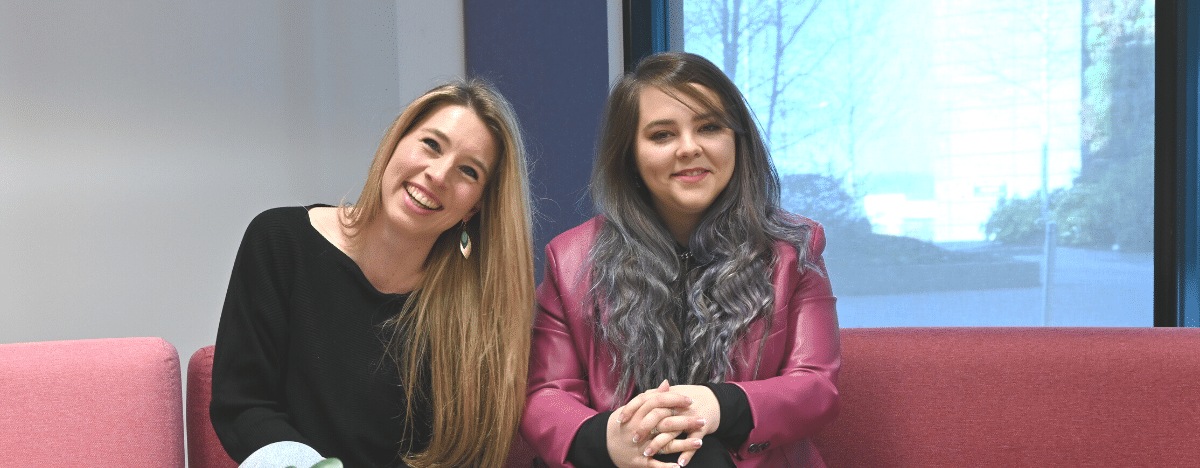On the occasion of International Women’s Day, on March 8, Tatiana and Melanie shared their experiences as expat women in Luxembourg.
Mélanie, of English and German origin, has been a Policy Manager at Foyer Global Health for 9 months and has been an expat in Belgium for 8 years. Before that, she lived in London and Paris. Tatiana, of Spanish origin, works as a Communication Manager and has been an expat woman in Luxembourg for over a year after living in Liverpool and Paris.
Why did you choose expatriation?

I first left the UK when I was 18. I was a real adventurer. I was fed up with school and life in Wales in general. I just wanted something new, a total adventure. So I didn’t prepare anything. I took my bag, put it on my back and left. Luckily, I had someone to go with!

It’s a bit the same for me, I told myself that I needed to change, so why not? My partner and I were sure we wanted to stay in Europe. We just had to choose a country where we spoke the language and go for it!
What were the difficulties during your expatriation?

For me, it was the language, because I didn’t speak French very well when I moved to Paris. I had to find a job. That was the most difficult thing. I didn’t have to deal with visa issues or anything like that. It was really more the integration into a society where I didn’t really speak the language

Yes, I totally agree with you, I think it was one of the main problems, the language barrier during the expatriation. Because when we learn a language at school, we are told “yes yes don’t worry, it’s enough, you can speak French”.

The truth is that language courses are not enough.

In Liverpool, where I was expatriated before, it was easier because only English is spoken. But here in Luxembourg, it’s very multicultural. There is French, English, I didn’t know at the beginning which language I should speak. The administrative side as well, sometimes it takes a long time to fill papers out. So I think these are the main difficulties for the expat.
Departure and expatriation, how did it go?

Well, I would say that considering my age, because I was 18 when I was preparing my expatriation, it is an age where you don’t think so much about what you’re leaving behind. We think more about what awaits us. So you are always ready for the adventure. I knew that I would come back and see my family regularly. Only a plane flight separated us, so for me it wasn’t difficult at all.

In my case, moving abroad was really difficult because I lived in places where I had no family or close friends. In the Spanish culture, we are very “familia” (family) oriented and easy to talk to. So it was hard to leave them behind. But at the same time… I choose the life I lead. I have to try to live new experiences. In two and a half hours by plane, I am with them.
How did your job search for the expatriation go?

Honestly, I had nothing before I got here. Like I said before, it was kind of an adventure. I had already prepared my CV. I had taken training courses, studies on certain subjects on which I wanted to be a specialist. Of course, I prepared my expatriation but it is true that I only started looking for a job when I arrived. The most important thing for me and my partner was to find an apartment. And as you can imagine, you need a job to pay for this apartment. So on the first day of my arrival, I started to send applications everywhere to find an expat job. And luckily I found one quickly!

For me it was quite different, I was working for an international insurance company in Paris and I was a bit tired of this city. I wanted a change. I had a friend who was already working in Luxembourg, he told me that there were great opportunities and asked me “Why don’t you look for a job here?”. My expat job search was on the internet and I saw an ad for a job in Luxembourg. I sent my CV and got a call the next day. As an anecdote, I was shopping in the African market of Château Rouge in Paris when I got the call, I had to quickly take refuge in a store to avoid the noise! Then everything went well and I got my job for the expatriation.
Have you encountered cultural differences in your workplace?

Yeah, quite some because coming from a Germanic background, but also a British one, you tend to keep a certain distance, shake hands or just say hello, from a distance. And when I first came to Paris, I would come to work and people would grab me and kiss me on the cheeks, and I would think, oh, my God, what’s going on?

It’s true! And in France, in general… we give three.

Then I froze, wondering what was going on. Just like everything else. You adapt.

Among the professional differences in expatriation, for me, it is rather the flexible hours. In Spain, it’s quite strict, you have to work your 8 hours. If you want to go out, you have to sign in. With my expatriation experience in Luxembourg, I find that it is more relaxed, we have more freedom!

It’s true! And in Luxembourg people start earlier, take a little break at noon and go home early. In Paris, you start at 9:30, there’s a break of at least an hour and a half, you go out to a restaurant, you eat on the terraces in the sun and you come home later. It’s a real difference in work culture.
What is it like to be an Expat as a woman?

In my opinion, the experience of being an expat woman has been very positive. I would say that it was more difficult for my parents than for me, because I was still young. I was 18 years old and I was leaving home to live in a foreign country. So I think they were wondering if I was going to make it? Would I have enough money? Would I be safe? I went abroad to study, but I had an expat spouse who was already there. So I was going to live with him in Paris. It was a few years later that I said to myself: “Well, I have to leave Paris”. But my partner had all his roots there, his friends, his family. And I told him that I wanted to leave and to come with me. He accepted. He followed me to Luxembourg. He put his hand on mine. He trusted me and we built this life here. So it worked out well.

That’s great. Because in most expatriation experiences, it is the man who finds a job and later the woman who follows him. But in our case, it’s true that we made the decision together. We had (both) jobs in our previous country. But I decided to leave. I told him that I really needed a change. Of course, we made a list of countries, chosen according to the languages spoken. We both had to be able to speak the language of the expat country… I said to my partner, I think we should go, it’s a great opportunity and it’s now or never. He said yes and we left just like that!
What do you miss the most?

It’s a bit of a cliché… but the food. The Spanish “Jamon”! Here, they only have ”Jambon Serrano” ….

“Jamon, is it Ham?”

It’s not the same thing! Never say that to a Spanish person!

The rhythm of life, I think, too, right?

Yes… The lifestyle… I think these are the most important things that make you feel nostalgic again.

…I miss the English breakfast.

Oh yes? Then you too the food!

For my part, I’m so used to having grown up in different places without spending too much time there. So I have roots, but I’m usually someone who is already all over the place. I miss my family, but I don’t miss my country.
Expatriation and homesickness, are you experiencing it?

Personally no, I would go back to my home country for vacations, not permanently. On the contrary, I have the desire to go further away. I visited a part of Central Europe and now I would like to go to a country like Costa Rica. At the end of the world!

For my part, I want to stay in expatriation. And like you, I’m not thinking of going back, except as you say for a vacation maybe…
What is the advantage of expatriation?

It gives you a new perspective. You’re more open-minded about a lot of things. I think that’s something very important. You’re really independent because you’re not at home with your mom and dad… I also think it teaches a lot of life lessons.

I totally agree. The main advantage of expatriation is that it broadens our horizons and opens our minds. I have been in contact with other cultures and other languages. I think that expatriation brings many positive things.
Foyer Global Health, leading insurer of expats
Like Mélanie ,Tatiana and thousands of expat women around the world, take advantage of our international health coverage. Adapted to all situations, we have a solution for you and your loved ones. Discover our complete and innovative range of products.



